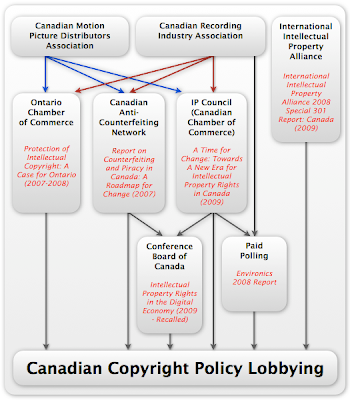The Conference Board of Canada plagiarism and undue influence story – which with the Board’s report and overdue apology to Curtis Cook will now go on hiatus until new reports are issued in the fall – has obviously attracted considerable interest. Looking back, while plagiarism is rare, it is the […]
Archive for June, 2009
Unravelling the Canadian Copyright Policy Laundering Strategy
The Conference Board of Canada plagiarism and undue influence story – which with the Board's report and overdue apology to Curtis Cook will now go on hiatus until new reports are issued in the fall – has obviously attracted considerable interest. Looking back, while plagiarism is rare, it is the public airing of the copyright lobby policy laundering effort that is the far more important development.
This lengthy post seeks to unravel the effort further by demonstrating how there has been a clear strategy of deploying seemingly independent organizations to advance the same goals, claims, arguments, and recommendations. Over the past three years, this strategy has played out with multiple reports, each building on the next with a steady stream of self-citation. The following diagram highlights the key players:
 |
Spectrum Lobbying Begins: Bell, Telus, Rogers Say They Overpaid Last Time
The lobbying over the next spectrum auction appears to have begun, with Rogers, Bell and Telus claiming that they overpaid last time due to the government's decision to create a set-aside for new entrants. The incumbent carriers express doubt that the Canadian market can support more than three big players.
Reflecting on the Digital Economy Conference
Ottawa has played host to many digital economy-type conferences over the years. Many have the same feel with pretty much the same people saying pretty much the same thing. Yesterday's conference titled Canada's Digital Economy: Moving Forward was different. The primary reason was leadership (the noteworthy impact of Twitter on the proceedings and Terry Matthews' warning against mimicking the U.S. on copyright which he said "has become so extreme that it inhibits creativity and innovation" rank a close behind). Both Industry Minister Tony Clement and Canadian Heritage James Moore left no doubt that they get it and are determined to craft laws and policies that look ahead rather than behind.
Clement closed the conference by noting how much has changed in the year since Bill C-61 was introduced. Clement said that it was "at least a somewhat different" public policy environment and committed to a copyright consultation this summer:
Reflecting on the Digital Economy Conference
Ottawa has played host to many digital economy-type conferences over the years. Many have the same feel with pretty much the same people saying pretty much the same thing. Yesterday's conference titled Canada's Digital Economy: Moving Forward was different. The primary reason was leadership (the noteworthy impact of Twitter on the proceedings and Terry Matthews' warning against mimicking the U.S. on copyright which he said "has become so extreme that it inhibits creativity and innovation" rank a close behind). Both Industry Minister Tony Clement and Canadian Heritage James Moore left no doubt that they get it and are determined to craft laws and policies that look ahead rather than behind.
Clement closed the conference by noting how much has changed in the year since Bill C-61 was introduced. Clement said that it was "at least a somewhat different" public policy environment and committed to a copyright consultation this summer:






